Before he was named by President Trump to the U.S. Elections Assistance Commission, Donald Palmer, a former GOP-appointed secretary of the Virginia State Board of Elections, assisted in the creation of sensational voter fraud reports that prompted a defamation lawsuit, documents released in the litigation Friday revealed.
Palmer helped devise an approach to collecting certain voter registration data, which was then used to claim that there were thousands of noncitizens on Virginia’s voter rolls and that many of them had voted, according to the documents. He also helped edit a draft of the report, and he additionally flagged for his collaborators that a Virginia state election official who was resisting turning over the data had previously worked for a civil rights organization.
“Of course, this is the pool of talent of the current governor,” Palmer allegedly wrote, referring to then-Gov. Terry McAuliffe (D).
The revelations came in the deposition of J. Christian Adams, whose group, the Public Interest Legal Foundation, released the reports. The lawsuit’s plaintiffs — who include citizens who were falsely identified in the reports’ materials as noncitizens who had illegally registered to vote — have accused Adams’ of withholding discovery and are now seeking to re-open his deposition.
In his original deposition, Adams claimed that he and Palmer worked “collaboratively” ahead of the release of the first iteration of the October 2016 report, known as “Alien Invasion.” A follow-up report, “Alien Invasion II,” was released in May 2017.
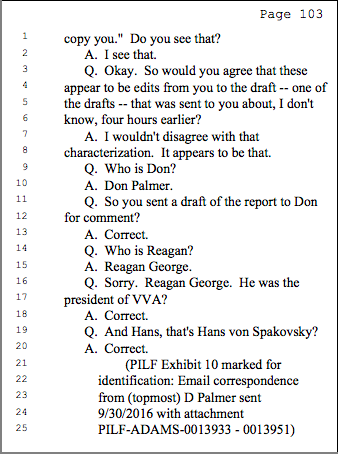
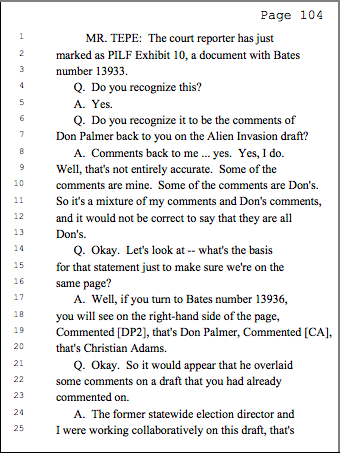
According to Adams, he discussed with Palmer the “availability” of so-called “noncitizen cancellation records” for PILF to obtain from elections officials. Adams later sent Palmer a draft of the report, which Palmer commented on with edits, according to the deposition.
Adams got combative, however, when he was asked whether he relied on Palmer’s assessment in deciding to label the individuals identified in the reports as noncitizens. Since the reports were released, elections experts have noted that honest mistakes or administrative errors could lead to the mistaken removal of citizens for citizenship status issues.
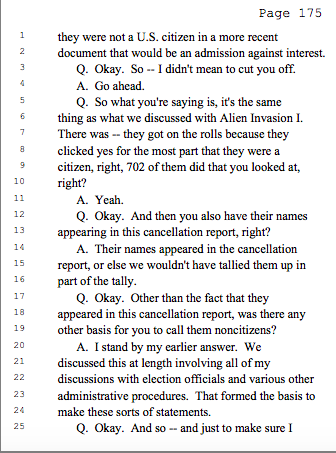
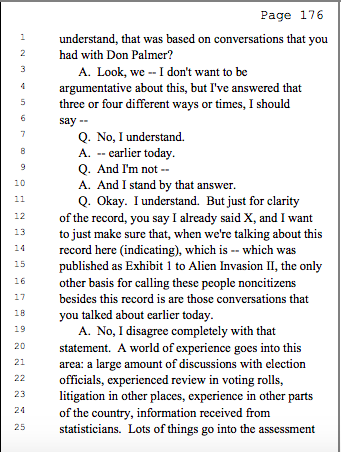 The plaintiffs in the case have alleged that Adams and his group engaged in voter intimidation and defamation by releasing the reports with an appendix that included the alleged noncitizens’ private information, and in some cases their addresses, phone numbers and Social Security numbers.
The plaintiffs in the case have alleged that Adams and his group engaged in voter intimidation and defamation by releasing the reports with an appendix that included the alleged noncitizens’ private information, and in some cases their addresses, phone numbers and Social Security numbers.
Adams has claimed that the materials are publicly-available voter records, and that he had no reason to believe that the records — which are created when an election official removes from the rolls a person because of some issue with his or her citizenship status — weren’t fully accurate. However, there is some evidence among the court documents released Friday that Adams was aware of the potential risks of relying upon those records to make his claims.
A volunteer who was working on the project wrote in October 2016 to another potential collaborator — who had expressed concern because he knew someone identified in the records — that 10-15 percent of the individuals are “accidentals” meaning “citizens had trouble with the forms.” The volunteer, Steven Albertson claimed in his own deposition he believed Adams was the source of the estimate.

“I would not have gotten any information on the data from any other source that — that — that I can recall,” Albertson said in his deposition.
Adams, however, had testified repeatedly in deposition that he considered the records “inherently reliable,” and pointed to what he had heard from “election officials” to defend that understanding.
Palmer also alerted Adams to the fact that Virginia’s elections commissioner at the time, Edgardo Cortes, had previously worked for a civil rights group called the Advancement Project, according to an email read back to Adams in the deposition.
(Palmer did not respond to a TPM inquiry seeking that he confirm or comment on the claims in the depositions, while an EAC spokesperson declined to comment).
Cortes had been urging local election officials against sharing some of the records Adams was seeking, citing a relevant privacy law.
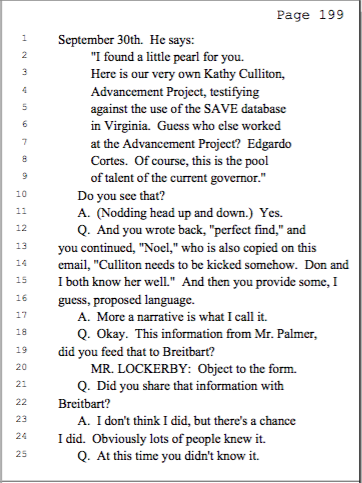
A question in Adams’ deposition implied that Adams then fed that information to Breitbart — something that Adams said he didn’t “think” occurred, but was possible. Regardless, Cortes played a prominent role in both Alien Invasion reports, which highlighted his connections to the Advancement Project.
Palmer was not controversy free when Trump named him to the U.S. Elections Assistance Commission, which provides states with resources and guidelines for administering elections. He had co-authored another report by PILF that claimed inaccuracies on the voter rolls was the “most significant problem facing America’s electoral process” and, as a Virginia elections official, he oversaw disastrous attempts to purge voter rolls.
Nonetheless, some election experts welcomed that his EAC confirmation, which, with the confirmation of Benjamin Hovland, meant that all four commission seats were filed after several years of vacancies and that the commission had the quorum it needed to engage in its duties.
Palmer also is not the only commissioner member who has played a role in hyping voter fraud allegations. EAC Chair Christy McCormick participated in Trump’s sketchy voter fraud commission, which was disbanded in less than a year due to the litigation it attracted. Palmer testified at one of the commission’s meetings.
Read the deposition transcripts below:






